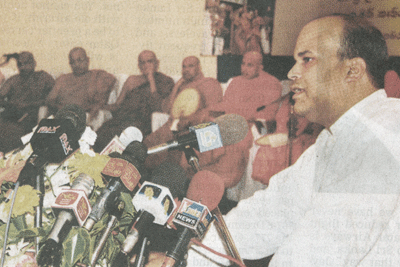
| 27/02/2008 - The Bottom Line | |||
| For just and fair Play in tourism sector – Commissioner for Tourism Administration starts work. | |||
 |
|||
(Photo – Tourism Minister Milinda Moragoda addressing the meeting) |
|||
The establishment of the office of Commissioner for Tourism Administration is to ensure the delivery of justice to any aggrieved party in the event of any injustice, unfair treatment or failure to perform any statutory obligations by any agencies in the tourism sector. The new office comes into operation with new institutional infrastructure implemented with the promulgation of the Tourism Act of 2005. The appointment was made by President Mahinda Rajapaksa on the recommendation of Chief Justice Sarath Nanda Silva. Appeal Court Judge L.K. Wimalachandra was appointed as the first Commissioner of Sri Lanka Tourism. The complaint forwarding procedure is to be announced in due course. Tourism Minister Milinda Moragoda speaking at the event held at Hotel School Auditorium to establish the new Commissioner’s Office said that the government has attempted to create a partnership between the government and the private sector in order to develop the tourism industry. “Certain institutional reforms we have taken in the year 2007 have laid the foundation to build a tourism industry fit for the 21st century”, he said. The Minister went on to state that three of the objectives he had set out for the Ministry had been achieved. One was creating a working ‘Sangha Advisory Council’ for advice and guidance on certain aspects in the tourism industry. The second was to appoint an authority to recommend solutions for concerns and disputes that arise within the industry. The third objective was to distribute the book Buddhism, Culture and Sri Lanka Pilgrim’s Guide to every hotel room in Sri Lanka by the end of this year. Chief Justice Silva, speaking at this event, commended the Minister saying that the law does not require the Minister to appoint a Commissioner and he had done so to ensure fairness in the tourism industry and he said that if the government could appoint to the all the ministries this type of commissioners it will benefit the country; that the role of the Commissioner of Administration for Tourism was similar to that of an Ombudsman. Justice Wimalachandra was a suave gentleman who would be able to tackle problems swiftly, he said, asserting that issues could be addressed to at an early stage before it boiled down to a crisis situation. A new institutional infrastructure came into operation with the promulgation of the tourism Act No. 38 of 2005. This includes Sri Lanka Tourism Development Authority (SLTDA) to formulate policies and plans for the tourism sector; to have jurisdiction over tourism development areas; to issue licneces for different enterprises; to prescribe, regulate and enforce standards; and, to administer the Tourism Development Fund. SLTDA will continue to be responsible for tourism infrastructure development work as provided for under the Tourism Development Act No. 14 of 1968, Sri Lanka Tourism Promotion Bureau (SLTPB) for marketing and promoting of Sri Lanka as a travel destination and Sri Lanka Convention Bureau (SLCB) to promote Sri Lanka as a venue for international, regional and domestic conventions, meetings and exhibitions. Also, Sri Lanka Institute of Tourism and Hotel Management (SLITHM) to undertake human resource development programmes in the tourism sector. Tourism, being a hospitality industry is expected to maintain very high standards in providing services to its clientele. Lack of adherence to such standards by the service providers results in lowering the image of the country, which in turn affects the demand for destination. Promotion and development of tourism requires an inclusive approach, which harmonises the interest of different enterprises – large, medium-small and mobilises community involvement and support. Above all, the regulatory functions of standard setting and enforcement, licensing etc. requires sound criteria and transparent and just and fair procedures. Remedies against any injustices by a public officer, though available under the judicial system, are currently in-expeditious and costly. The smooth functioning of the new development and regulatory administration infrastructure introduced in the tourism sector therefore needs an administrative mechanism to ensure speedy remedies against injustices, unfair treatment or practices, failure to perform statutory obligations etc. by tourism service providers to their clients or by an officer of SLTDA, SLTPB, SLCB, or SLITHM. Given this backdrop the Tourism Minister has taken this long over due initiative to set up a dynamic structure which can ensure the delivery of justice to any aggrieved party either as individuals or as organisations in the event of any injustice, unfair treatment or failure to perform any statuary obligations by any agencies in the tourism sector prevails. It is for this purpose that court of Appeal Judge Wimalachandra has been appointed by the President and he will take up office shortly. The complaint forwarding procedure will be announced formally. Coinciding with this event, a book compiled kirama Wimalajothi Thera titled Buddhism, Culture and Sri Lanka Pilgrim Guide printed by the Ministry will be distributed by the most venerable mahasangha as a token among greater Colombo hotels. The book was printed for two reasons: Firstly, to commemorate the 60th anniversary of independence and secondly, in memory of late Tourism Secretary P.M. Leelaratne. The setting up of the office of the Commissioner for Tourism Administration and printing of the book on Buddhism for tourists’ use are two out of several such dynamic initiatives pursued during the past one year under the guidance of the Tourism Minister. Setting up advisory committees with experts and professionals relating to various aspects of tourism such as domestic tourism, community tourism, adventure tourism, ayurvedic and indigenous tourism, golf tourism, and the development of very close relationships with the provincial council tourism authorities, paying high priority to the development of domestic tourism establishment of the tourism police division are among other projects. |
|||